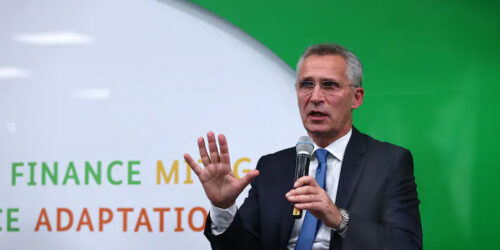For years, militaries around the world saw protecting their citizens as contradictory to protecting the environment. But the presence of top defense leaders, including NATO’s secretary general, at a U.N. climate change conference on Tuesday suggested that is starting to change.
The Tuesday visit from NATO Secretary General Jens Stoltenberg to the Glasgow climate talks was the first time a top alliance leader has come to the gathering since its first round in 1995. The trip came less than two weeks after the Pentagon, the White House and the U.S. intelligence community warned that climate change was a major threat to U.S. security.
Stoltenberg said his trip was intended to send a message about the relationship between defense and climate change.
“Climate change is a crisis multiplier. It forces people to flee. It increases competition over scarce resources like water and land. It makes the world a more dangerous place,” he said in an interview, noting that even now, military emissions were not part of the climate talks even though they are a significant source of greenhouse gases in most countries.
In the last year, Stoltenberg, a former U.N. special envoy for climate change, has pushed to make climate issues more central at NATO, getting leaders to sign on to a pledge in June to do a better job counting military emissions and to prepare a strategy to adapt to a warming world. The goal is both to help militaries reduce their emissions and also to get them prepared for an altered world. Wars will be fought over access to water. More submarines will be prowling the melting Arctic Sea. Millions of people could be forced to leave their homes because of extreme weather.
“There are many things we can do to reduce emissions, but not to choose between having a climate-friendly or a strong army. We need both,” he said.
White House, intelligence agencies, Pentagon issue reports warning that climate change threatens global security
Until now, military emissions have often not been counted at all. Or if they were counted, they were treated as a classified secret, on the thought that adversaries could use the information to divine something about military capabilities.
But all the fighter jets, tanks and frigates in militaries emit greenhouse gases. NATO pushes countries to spend at least 2 percent of their economies on defense. And since the military is an emissions-heavy sector, it’s likely a far larger part of national emissions than that.
Emissions “disappeared from the statistics, but it didn’t disappear from the atmosphere,” Stoltenberg said.
He noted that as civilian vehicles move away from gasoline and diesel, military vehicles could face difficulties if they were among the last to rely on fossil fuels. They’ll need to adapt no matter what, he said — which might not be a bad thing, since the logistics involved in transport fossil fuels in a combat zone is often a liability. Military fuel tankers were Taliban targets in Afghanistan.
NATO as an organization plays no formal role in the U.N. climate talks, the core of which are focused on what individual nations can do to reduce global warming. But during Stoltenberg’s day-long visit to Glasgow, he met with a host of leaders to talk to them about climate change as well as more run-of-the-mill security issues, his office said.
“Climate change is increasing state vulnerability and state fragility,” Kenyan Foreign Minister Raychelle Omamo said at an event that included Stoltenberg and was organized by the Munich Security Conference. She warned that countries in sub-Saharan Africa increasingly faced security challenges driven by climate change.
Sitting alongside Omamo, British Defense Secretary Ben Wallace said that his military was also increasingly focused on global warming. The British Ministry of Defense released a strategy in March aimed at preparing itself for climate challenges in the decades to come.
“We have a strong obligation to make sure that our forces deliver a sustainable deployment,” he said. “But we will also have to deal with the consequences of a failed climate change policy, if that happens. We will have to deal with the consequences of migrant flows, the breaking down of communities, of fights over rare resources.”







